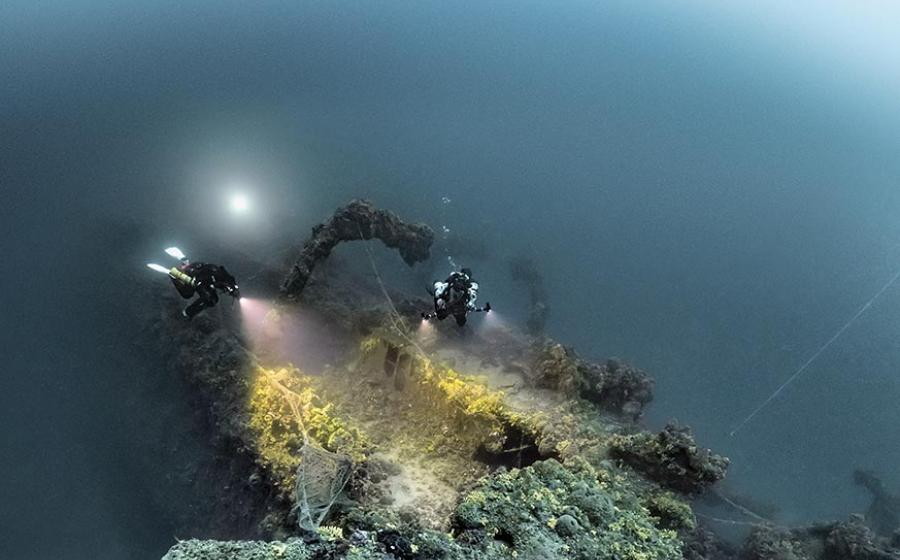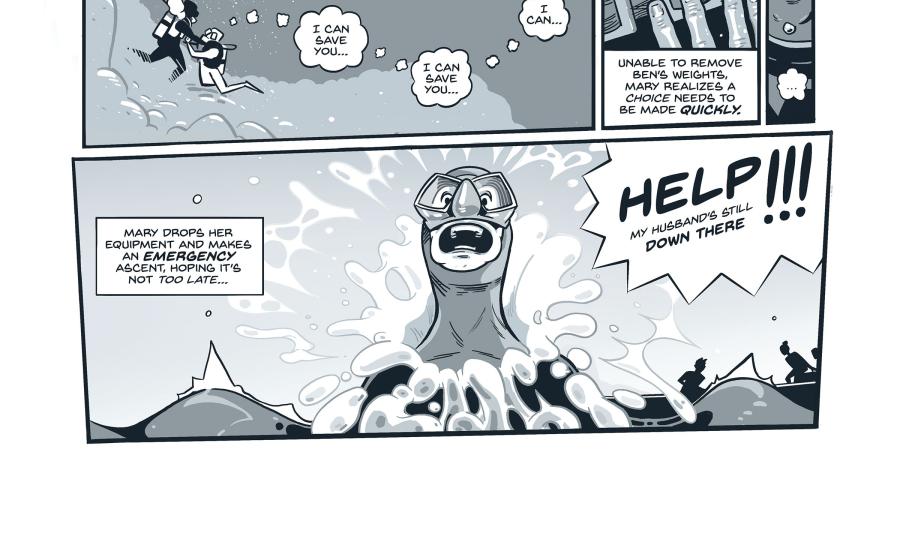Top 100: Bahamas
Sharks, sharks, dolphins and more sharks. Island-hopping in the Bahamas means checking of a handful of species from your list: Caribbean reefies, hammers, tigers, oceanic whitetips and more. In Bimini, operators regularly offer swims with wild Atlantic spotted dolphins. But back to the sharks: Nearly every island has an aggregation or feeding site, making this destination No. 1 in the Caribbean and Atlantic in our Top 100 Readers Choice Awards for big animals, surely a factor in why these 700 islands also earned top honors for overall diving. Beyond the parade of dorsals, the Bahamas is also home to reefs, wrecks, walls and caves — the diving is as challenging or as breezy as you like.
Here's Scuba Diving's top 6 reasons to dive in the Bahamas.
1. Bimini’s Hammerheads
It’s the easiest great hammerhead encounter in North America — the success rate stands at 100 percent. At a feeding site just outside the harbor of South Bimini, these 13-foot-long predators arrive every February. Operators such as Neal Watson’s Dive Center take guests to the 15-foot-deep site where they feed hammerheads chunks of mahimahi and bonita. For divers and especially photographers, it’s a thrilling and intimate experience: On a typical dive, anywhere from three to nine sharks come within bumping distance, making for guaranteed jaw-dropping close-ups. Bonus: The site is so close to shore that you can hop on the Wi-Fi network of Bimini Sands Resort and Marina, and instantly upload.
2. Wreck Diving
New Providence has a number of wrecks, including the cargo ship Ray of Hope, which is perched between the edge of a wall and Stuart Cove’s shark-feed site. After dropping deep, stroll its top deck to decompress while hanging with goliath grouper and reef sharks. Grand Bahama has the nicely encrusted Theo’s Wreck, a 230-foot freighter that’s been down since 1982. Off Long Island, the 110-foot M/V Comberbach is a must-dive freighter at 115 feet, with a utility van on deck and black coral thriving along the wheelhouse. Off South Bimini, divers can check out the partly-above-water SS Sapona, sitting in 18 feet; grunts and snapper weave among the sponge-covered supports.
3. Tiger Beach
You’ve seen the footage: A tiger shark chomps down on an underwater camera; insanely awesome video is the result. This is the stuff of Tiger Beach, a site off Grand Bahama where Stuart Cove’s Dive Bahamas runs year-round dive trips. Many visitors get hooked instantly on interactions with this species, whose silver-dollar eyes not only track us but also give the sense of a greater connection.
4. Caribbean Reef Shark Feeds
“They’re like golden retrievers,” says Cristina Zenato, head trainer at UNEXSO dive facility on Grand Bahama, of the Caribbean reef sharks she works with. “I don’t get to scratch their heads while I watch TV at night, but I wish I could.” Instead, she joins fellow crew for daily feeds, with guests gathered in a semicircle behind her on a sand patch. Most sharks are regulars — meaning they learned the drill long ago. They stay calm and orderly, recognizing they earn fish heads for good behavior. Divers new to shark diving can build confidence with the experience, and learn to read a shark’s body language and behavior. Zenato, with UNEXSO since 1995, readily doles out trivia and tidbits.
5. Tongue of the Ocean
Call up the Bahamas on Google Earth’s satellite view, and you’ll find that this is an area of contrasts. The archipelago was named for its shallow seas (baha mar) — think of the beaches with turquoise waters on all the post-cards — but don’t overlook some of the best wall diving in the world. Off the coast of Andros is a cobalt-blue, hockey-stick-shaped oceanic trench — 20 miles deep in some patches. Whether you’re diving on air, nitrox, rebreather or inside a submarine, this is a destination with enough depth to satisfy all profiles.
6. Current-Fueled Drifts
The never-ending vistas of sea, sky and sand in the Bahamas can completely relax you, but for divers who don’t mind a current-fueled drift, there are sites where adrenaline junkies can get their kicks, just one reason readers scored Bahamas high for advanced diving (it’s not just about the sharks). Channels between the islands in the chain can deliver hold-onto-your-reg drift diving. Current Cut in Eleuthera is arguably the most famous. Some operators offer multiple runs through the cut, where you’ll fly with the fish past large coral heads and colorful filter feeders. The dive boat picks you up as you exit the channel. The current also cooks at Wax Cay Cut in the Exumas. Forget the camera — usually at these sites it’s futile to do anything other than go with the flow.
Want more scuba diving travel?
Diving Mexico's Sea of Cortez | Shark Diving in Cuba's Gardens of the Queen
Sharks, sharks, dolphins and more sharks. Island-hopping in the Bahamas means checking of a handful of species from your list: Caribbean reefies, hammers, tigers, oceanic whitetips and more. In Bimini, operators regularly offer swims with wild Atlantic spotted dolphins. But back to the sharks: Nearly every island has an aggregation or feeding site, making this destination No. 1 in the Caribbean and Atlantic in our Top 100 Readers Choice Awards for big animals, surely a factor in why these 700 islands also earned top honors for overall diving. Beyond the parade of dorsals, the Bahamas is also home to reefs, wrecks, walls and caves — the diving is as challenging or as breezy as you like.

John BantinDivers are flocking to Bimini for great hammerhead aggregations.
Here's Scuba Diving's top 6 reasons to dive in the Bahamas.
1. Bimini’s Hammerheads
It’s the easiest great hammerhead encounter in North America — the success rate stands at 100 percent. At a feeding site just outside the harbor of South Bimini, these 13-foot-long predators arrive every February. Operators such as Neal Watson’s Dive Center take guests to the 15-foot-deep site where they feed hammerheads chunks of mahimahi and bonita. For divers and especially photographers, it’s a thrilling and intimate experience: On a typical dive, anywhere from three to nine sharks come within bumping distance, making for guaranteed jaw-dropping close-ups. Bonus: The site is so close to shore that you can hop on the Wi-Fi network of Bimini Sands Resort and Marina, and instantly upload.

National Geographic Image Collection/AlamyBlue holes are a classic Bahamian experience.
2. Wreck Diving
New Providence has a number of wrecks, including the cargo ship Ray of Hope, which is perched between the edge of a wall and Stuart Cove’s shark-feed site. After dropping deep, stroll its top deck to decompress while hanging with goliath grouper and reef sharks. Grand Bahama has the nicely encrusted Theo’s Wreck, a 230-foot freighter that’s been down since 1982. Off Long Island, the 110-foot M/V Comberbach is a must-dive freighter at 115 feet, with a utility van on deck and black coral thriving along the wheelhouse. Off South Bimini, divers can check out the partly-above-water SS Sapona, sitting in 18 feet; grunts and snapper weave among the sponge-covered supports.

Stephen Frink Collection/AlamyThe M/V Comerbach off Long Island.
3. Tiger Beach
You’ve seen the footage: A tiger shark chomps down on an underwater camera; insanely awesome video is the result. This is the stuff of Tiger Beach, a site off Grand Bahama where Stuart Cove’s Dive Bahamas runs year-round dive trips. Many visitors get hooked instantly on interactions with this species, whose silver-dollar eyes not only track us but also give the sense of a greater connection.

Charo Gertrudix/ Ultima FronteraA shark at Tiger Beach, Grand Bahama
4. Caribbean Reef Shark Feeds
“They’re like golden retrievers,” says Cristina Zenato, head trainer at UNEXSO dive facility on Grand Bahama, of the Caribbean reef sharks she works with. “I don’t get to scratch their heads while I watch TV at night, but I wish I could.” Instead, she joins fellow crew for daily feeds, with guests gathered in a semicircle behind her on a sand patch. Most sharks are regulars — meaning they learned the drill long ago. They stay calm and orderly, recognizing they earn fish heads for good behavior. Divers new to shark diving can build confidence with the experience, and learn to read a shark’s body language and behavior. Zenato, with UNEXSO since 1995, readily doles out trivia and tidbits.

Tim CalverBoth UNEXSO and Stuart Cove's are renowned for shark dives.
5. Tongue of the Ocean
Call up the Bahamas on Google Earth’s satellite view, and you’ll find that this is an area of contrasts. The archipelago was named for its shallow seas (baha mar) — think of the beaches with turquoise waters on all the post-cards — but don’t overlook some of the best wall diving in the world. Off the coast of Andros is a cobalt-blue, hockey-stick-shaped oceanic trench — 20 miles deep in some patches. Whether you’re diving on air, nitrox, rebreather or inside a submarine, this is a destination with enough depth to satisfy all profiles.
6. Current-Fueled Drifts
The never-ending vistas of sea, sky and sand in the Bahamas can completely relax you, but for divers who don’t mind a current-fueled drift, there are sites where adrenaline junkies can get their kicks, just one reason readers scored Bahamas high for advanced diving (it’s not just about the sharks). Channels between the islands in the chain can deliver hold-onto-your-reg drift diving. Current Cut in Eleuthera is arguably the most famous. Some operators offer multiple runs through the cut, where you’ll fly with the fish past large coral heads and colorful filter feeders. The dive boat picks you up as you exit the channel. The current also cooks at Wax Cay Cut in the Exumas. Forget the camera — usually at these sites it’s futile to do anything other than go with the flow.
Want more scuba diving travel?
Diving Mexico's Sea of Cortez | Shark Diving in Cuba's Gardens of the Queen










